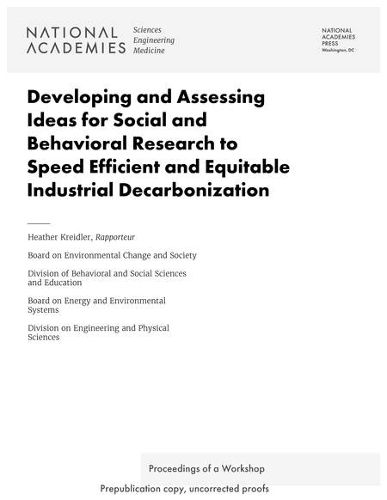Readings Newsletter
Become a Readings Member to make your shopping experience even easier.
Sign in or sign up for free!
You’re not far away from qualifying for FREE standard shipping within Australia
You’ve qualified for FREE standard shipping within Australia
The cart is loading…






Interest in decarbonizing various sectors of the U.S. economy has produced a rich body of scholarly research, policy studies, and practitioner reports on technology pathways and scenarios, with a particular focus on the power sector, vehicles, and buildings. The research on nontechnological issues associated with decarbonization is much sparser in general, and this is particularly true for the difficult-to-decarbonize industrial sector. In February 2024, the National Academies of Sciences, Engineering, and Medicine hosted a public workshop designed to inform the development of ideas for a national interdisciplinary social sciences research agenda relating to an efficient and equitable clean energy transition in the U.S. industrial sector. The workshop planning committee solicited and commissioned several papers aimed at outlining key societal challenges and needs that require social science insights and tools to build a social compact for industrial decarbonization. At the workshop, an interdisciplinary group of social scientists, engineers, community groups, and experts from industry and government explored the social science research needs on these issues. This proceedings of the workshop describes the presentations and discussions.
Table of Contents
Front Matter 1 Introduction 2 Social Science Issues Associated with the Siting of Infrastructure for Industrial Decarbonization 3 Social Science Research Needs for Understanding and Planning for Labor Impacts of a U.S. Low-Carbon Energy Transition 4 Just Process for Equitable Industrial Decarbonization: A Social Science Research Agenda 5 Exploring Social Science Factors Impacting Technology Development Toward Industrial Decarbonization 6 Reflections from Day One 7 Defining, Measuring, and Seeking Solutions to Environmental Justice Issues for Industrial Decarbonization 8 Trust and Cooperation Between Governments and the Public 9 Considering Firm and Industry Responses to Decarbonization Goals 10 Workshop Wrap-Up Appendix A: Workshop Agenda Appendix B: Planning Committee Members and Speaker Biographies
$9.00 standard shipping within Australia
FREE standard shipping within Australia for orders over $100.00
Express & International shipping calculated at checkout
Interest in decarbonizing various sectors of the U.S. economy has produced a rich body of scholarly research, policy studies, and practitioner reports on technology pathways and scenarios, with a particular focus on the power sector, vehicles, and buildings. The research on nontechnological issues associated with decarbonization is much sparser in general, and this is particularly true for the difficult-to-decarbonize industrial sector. In February 2024, the National Academies of Sciences, Engineering, and Medicine hosted a public workshop designed to inform the development of ideas for a national interdisciplinary social sciences research agenda relating to an efficient and equitable clean energy transition in the U.S. industrial sector. The workshop planning committee solicited and commissioned several papers aimed at outlining key societal challenges and needs that require social science insights and tools to build a social compact for industrial decarbonization. At the workshop, an interdisciplinary group of social scientists, engineers, community groups, and experts from industry and government explored the social science research needs on these issues. This proceedings of the workshop describes the presentations and discussions.
Table of Contents
Front Matter 1 Introduction 2 Social Science Issues Associated with the Siting of Infrastructure for Industrial Decarbonization 3 Social Science Research Needs for Understanding and Planning for Labor Impacts of a U.S. Low-Carbon Energy Transition 4 Just Process for Equitable Industrial Decarbonization: A Social Science Research Agenda 5 Exploring Social Science Factors Impacting Technology Development Toward Industrial Decarbonization 6 Reflections from Day One 7 Defining, Measuring, and Seeking Solutions to Environmental Justice Issues for Industrial Decarbonization 8 Trust and Cooperation Between Governments and the Public 9 Considering Firm and Industry Responses to Decarbonization Goals 10 Workshop Wrap-Up Appendix A: Workshop Agenda Appendix B: Planning Committee Members and Speaker Biographies